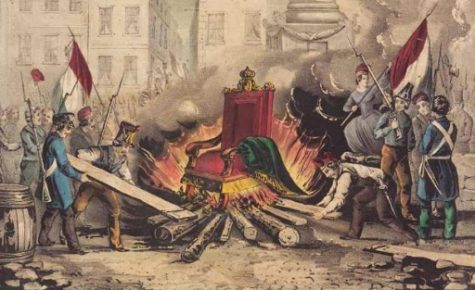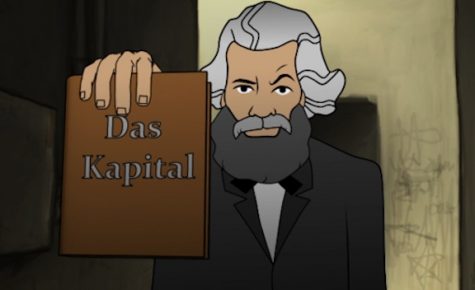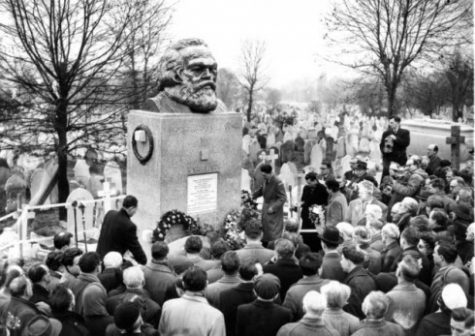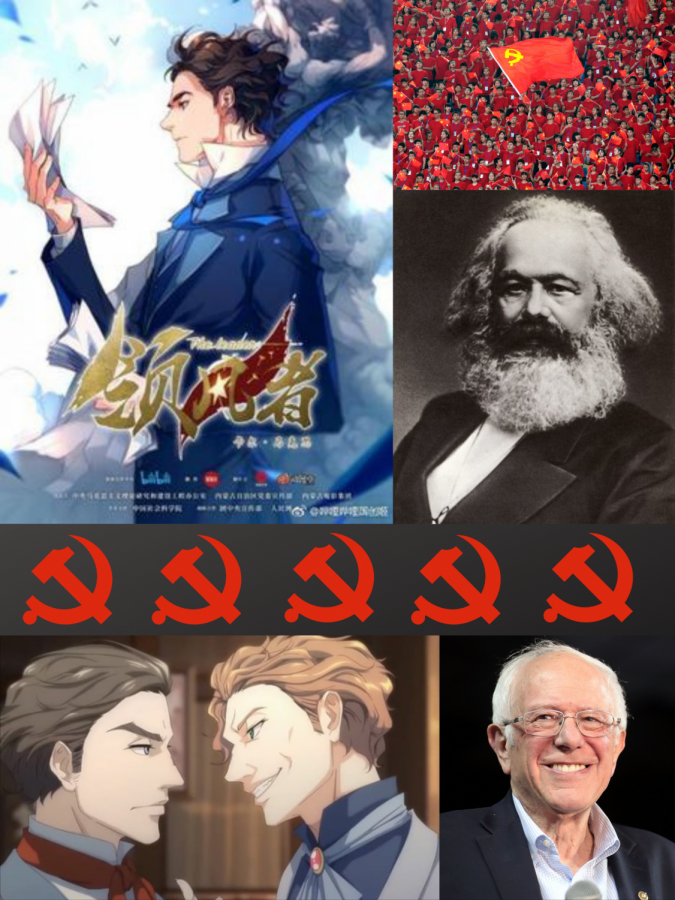The Leader: Zhong Jun’s Masterpiece
The Leader, or 领风者, is a Chinese animated series, which more or less the whole cosmos has acknowledged as propaganda. The web series was started with the express purpose of showing teenagers how awesome Marxism is. It was shown weekly on Bilibili in 2019 and caught the eye of many pro- and anti-Marxist figures. The show is comprised of seven enthralling episodes, each displaying important moments in the life of German philosopher, economist, revolutionary, and intellectual Karl Marx.
Episode 1: “Different Youth”
The first episode begins with a sad event: the funeral of Karl Marx. The eulogy recalls the achievements of “the greatest living thinker.” Suddenly, Marx is giving his middle school graduation speech, an uplifting, motivating, and fabulous work of art. He commands his fellow students to consider their future, and reveals a powerful message: people are more advanced than animals, and therefore have the freedom to choose their own destiny.

The episode proceeds to dive into the early relationship of Marx and his future wife, Jenny. As the bond shifts from friendship into romance, the audience experiences the marvels of young love. Marx continues his romantic relationship with Jenny in secrecy as he progresses in academia. While at the University of Bonn, he lives a lavish lifestyle, which his father does not find endearing.
Marx is compelled by his father to transfer to the University of Berlin. While there, he focuses more clearly on philosophical questions raised throughout history. He eventually relinquishes his agreements with Kantian thought as he propels towards Hegelianism. Marx believed Kantian thought to be too abstract, and that it stuck him in a pit of agnosticism. He concluded that Hegel’s dialectic provided the answers to his philosophical questions. Marx found that the synthetic Hegelian solution to all struggles cannot be advanced unless everyone takes a side. The scene ends with Marx explaining that studying law may be the way to personal fame, but philosophy is the weapon that can produce true happiness.
Episode 2: “Defending the Rights of the People”
Marx is monomaniacally immersed in his studies. He joins the Young Hegelians, submits his doctoral thesis to a less conservative university, and criticizes the local governor. He starts working at the Rheinische Zeitung newspaper, and the episode outlines his constant clash with Prussian state censorship. Marx now rejects Hegelian thought, believing it to put too much emphasis on religion, rather than class.

As in the first episode, Marx’s monologues demonstrate his evolution in philosophical thought. The episode depicts his first arrest and deportation. The final scene is a shocking conversation between Jenny, her brother, and her mother.
Jenny decides that she will no longer give up her happiness to protect her family’s name, but instead pursue marriage with the love of her life. The scene points toward a moral imperative for all people: we must do what we love and what is right, not act out of political or social expediency.
Episode 3: “A New World View”

Marx starts to notice a man named Friedrich Engels, who was also once a Young Hegelian. “The Condition of the Working Class in England” is the literary piece that brings his attention to Engels’ exceptional writing. Engels also admires Marx for his verdicts on the limitations of practical Hegelianism.
The episode also outlines Marx’s early transition to scientific socialism, his advocation for revolution, his critiques of the Young Hegelians, and his expulsion from France to Belgium. “A New World View” is where the series really hits its stride.
Episode 4: “Scientific Socialism Shines Brightly”

Episode 4 demonstrates Marx’s fights against the erroneous thought of Weitling, Kriege, and Proudhon. He despises the idea of “Christian Communism”, and renames the League of the Just to the Communist League. The CCP actively promotes atheism so, of course, Marx’s position is further used to push that belief system on children. Marx and Engels combine their materialist thought into the Communist Manifesto, proclaiming that “the history of all hitherto existing society is the history of class struggles.”
Revolutionary sentiments and upheavals occur across Europe, and Marx is sent back to France in exile. The episode dives deep into Marx and Engels’ fight against alternative forms of communism and socialism, which they believe confuses the working class.
Episode 5: “Great Work: Das Kapital”

Marx is sent off from France and finds refuge in England. He experiences severe poverty and disease. Luckily, Engels is able to help him financially. Marx has a meaningful interaction with a young child, Tom, where he explains many of his thoughts. He describes surplus value, exploitation, overproduction, and many other phenomena that Tom’s father struggles with.
Marx describes his criticisms of capitalism and the inherent contradictions in the system. He sees the only solution as workers owning the means of production. Marx experiences trouble at home and even becomes sick during the twenty-year process of publishing the first volume of Das Kapital. The book expounded his theories about the capitalist system: its dynamism, its immorality, and its self-destructive tendencies.
Episode 6: “First International”
Marx refuses to work for the government. Despite losing many opportunities, he believes that he must not abandon his values to advance his agenda. He meets Tom again, now a grown man. Marx finally coins the phrase “dictatorship of the proletariat” as he discusses the civil war in France. Marx continues to gain popularity around the world, but unfortunately takes ill again. The late life of Marx is riddled with tragedy, but nevertheless, he continues his battle for workers’ rights, which in this episode includes his final split with Bakunin.
Episode 7: “Marx Forever”
In this episode, Das Kapital is published in Russia, and Marx begins learning Russian. Even in his late years, he seems unstoppable. Marx and Engels both halt many other projects to instead criticize Dühring. [Ed.Note—in case you think this article is too complimentary, we’d like to point out that Marx and Engels were constantly stopping their own work to criticize people they disagreed with on the fine print, which may explain why everything they wrote took forever to publish.] They finally express their idea of “dialectical materialism.” Marx expresses it in the following way: material conditions, and the world around us, form and impact our ideas, but the important part (and the part that Marx established) is that it also works the other way. Not only do ideas produce our material conditions, but our material conditions give birth to our ideas. Another way of describing it is that the conflict of many social forces is in actuality a series of contradictions and their solutions—hence dialectical materialism. Marx claimed that these contradictions are most commonly because of material conditions, heightened by the exploitative bourgeois society that workers live in. The episode also shows his wife’s death, the death of another one of his children, and then finally, his death.
The other two volumes of Das Kapital are finished by Engels, and the series ends with an afterword on Chinese communism and the role of Karl Marx in history.
Closing Remarks
The show is unquestionably more appealing to those with prior understanding of Marxist thought. Given that communism is not depicted as fundamentally evil, the West did not particularly like the idea of the series itself being aired to countless children in China to inject Karl Marx into their lives. The mischaracterization of some Marxist thought is apparent throughout the show, and the CCP has obviously focused on certain aspects of Marx’s life to align their views with his.

It is unambiguous that this show was used to promote communism and attempt to justify some of the PRC’s actions as “Marxist.” Although this may seem like a grim, repulsive thing to some Americans, it is critical to remember all of the anti-communist and pro-capitalist propaganda that most Western nations have put out. There is a simple ideological difference between those who advertise shows like The Leader, and those who justify American propaganda. The crucial element to recognize is that the act itself is not excused solely because of an ideological difference—one must remain consistent in their anti-propaganda beliefs, and not only denounce it when they disagree on the substantive matter at hand.
Overall, I would consider the show a great watch, and the fact there are only seven episodes with a maximum length of 30 minutes makes it very easy to binge. Another plus is that the characters are actually written quite well, even if some of them are rendered much more attractive than their real-life counterparts. This is obvious if you look at Marx himself: while, in the real world, he was a 5’9″ nerd, he is depicted in the show as having the figure of a Greek god.
While the show serves many different purposes, it does provide at least a decent account of Marx’s life, especially for someone who has not studied the matter in depth. It dives into some of the political and philosophical debates of the era, and has a great ending theme in every episode. Several of the scenes are bolstered by the soundtrack, and Marx’s speeches in the production are forcefully, if unsurprisingly, inspirational. A solid 4 out of 5.
